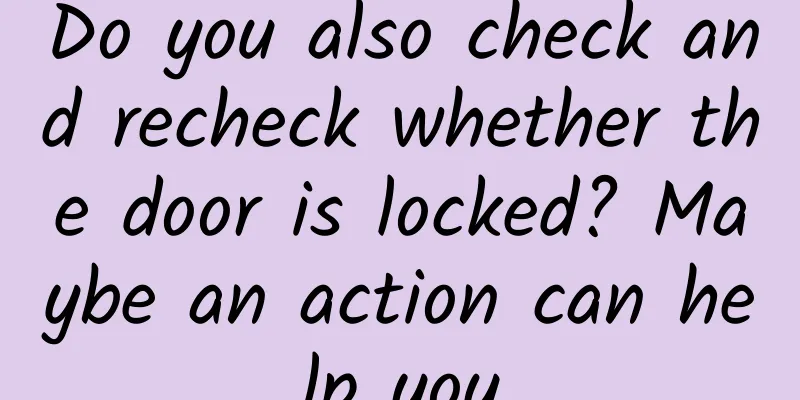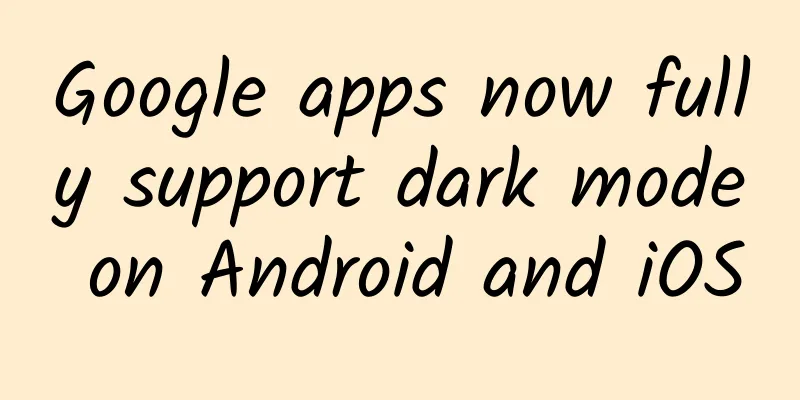Do you also check and recheck whether the door is locked? Maybe an action can help you

|
Double-checking whether the door is locked is really a very common problem! A few years ago, I was working in the city center. I joked with a colleague who just arrived at the company and lived in the suburbs, "Is your door closed?" My colleague was so anxious that he asked for leave to go home to check the door (nearly 30 kilometers one way); My college roommate went out earlier than anyone else every day. When I was half asleep, I often heard her push the door from outside and repeatedly check whether it was closed. My mother often sees the aunt who lives downstairs pushing and pulling the door outside. When she asks her what happened, she always says, "I'm checking if the door is locked." This sounds a lot like what everyone calls obsessive compulsive disorder? How can I feel better? Should I go to the hospital for treatment? What is obsessive-compulsive disorder really like? It is definitely annoying to check the door again and again even though it is already closed. However, generally speaking, this is not yet a "disease" and cannot be considered clinical obsessive-compulsive disorder. So what does obsessive-compulsive disorder really look like? The fifth edition of the Diagnostic and Statistical Manual of Mental Disorders (DSM-5) states that obsessive-compulsive disorder is a mental illness characterized by obsessive thoughts and/or compulsive behaviors[1]. Obsessive thoughts: Invaders in the brain Obsessive thinking is the experience of repetitive, persistent, intrusive, and unnecessary thoughts over a period of time, and most people will feel obvious anxiety and distress as a result. When the epidemic first emerged in 2020, many people had the problem of compulsive hand washing. On the one hand, they felt painful, and on the other hand, they could not control their actions of washing hands, so they had to seek help from the psychological hotline. For example, during that period, Xiao C had to wash his hands for exactly 5 minutes each time. If the time was a little shorter or longer, he would have to start over again until it was exactly 5 minutes. When washing his hands, Xiao C always had the thought "If I don't wash for 5 minutes, I will get COVID-19." Xiao C had no control over this thought, and it completely dominated him, making it impossible for him to think like an ordinary person, "Although the epidemic is not over, my current environment is safe." Xiao C's idea is a manifestation of obsessive thinking. Compulsive behavior: The body is controlled Compulsive behavior refers to repetitive behaviors or mental activities, such as constantly checking whether the door is closed, whether the gas is safe, repeatedly counting the items around you, and repeating a word silently in your mind. One point that is particularly important to note is that compulsive behavior is often initially intended to reduce the anxiety and pain caused by obsessive thinking. Let’s take Xiao C as an example. The reason why he washed his hands repeatedly was to fight the anxiety caused by the obsessive thinking in his mind that "I will get the new coronavirus if I don't wash my hands." Gradually, the act of washing hands became more and more extreme: more times, longer durations, and must be washed for a specified time. After reading this, do you feel that people with obsessive-compulsive disorder are really suffering? They have lost the ability to completely control themselves, just like a rogue program repeatedly popping up on a computer and can't be turned off no matter what. People with obsessive-compulsive disorder often wash their hands frequently, causing their hands to peel and bleed. Do I have obsessive compulsive disorder? Seeing this, many people may have diagnosed themselves with obsessive-compulsive disorder. But wait, there are standards for diagnosing obsessive-compulsive disorder. In the diagnosis of obsessive-compulsive disorder, the most important point is to see whether the obsessive thoughts and compulsive behaviors take up more than one hour a day, and whether these obsessive symptoms have seriously affected the person's life. If the person has difficulty going to school or work, sleeping well, eating or overeating due to obsessive-compulsive symptoms, then even the person is seriously affected and even a psychological counselor can't do anything. Go find a psychiatrist for help immediately! However, approximately 28.2% of people worldwide will experience obsessive-compulsive symptoms at some point in their lives[2]. Monica in "Friends" will feel uncomfortable if she doesn't clean her house spotlessly, but it doesn't seem to cause her much trouble丨"Friends" If your condition does not meet the diagnostic criteria, but you are indeed feeling troubled, then let's continue reading. Is it anxiety or compulsion? In my work and life experience, I found that under the cover of obsessive-compulsive symptoms, the underlying problem is often anxiety. Many people's "obsessive-compulsive disorder" is actually a manifestation of anxiety. One of my friends would worry about whether the door was closed at home almost every day, but when he got to work, he almost stopped worrying about it and could work normally. In addition to repeatedly worrying about the door, he also had difficulty eating and often suffered from insomnia during that period. I talked to him in detail and found out that his mother's shop was recently robbed and a large sum of money was lost. Recently, his mother had been telling him about the loss of the family. He was sad and panicked that his mother's life savings were suddenly stolen. Anxiety caused by specific events, although it has similar symptoms to obsessive-compulsive disorder, is not obsessive-compulsive disorder. People who check the gas switch 10 times a day may have themselves or someone around them who has faced the danger of gas leaks, and therefore have anxiety about gas safety; People who repeatedly check their social media, if they are not too idle, may have been criticized for missing work news and suffer from heavy workplace anxiety; People who insist on opening new messages from all apps probably have a certain degree of social anxiety and worry about being alienated by others, so they hope to receive new message notifications as soon as possible. Of course, like OCD, anxiety needs to be seen, bandaged, and dealt with. If you don't want to worry about locking the door repeatedly, try this Anxiety causes behaviors such as repeatedly locking the door to cause trouble, but it is not yet pathological. What can I do to make myself feel better? More actions We can try cognitive behavioral therapy, which is the most commonly used clinical treatment for obsessive-compulsive disorder. Although we may not reach the level of obsessive-compulsive disorder in our lives, we can also use cognitive behavioral therapy to make ourselves feel better. To put it simply, our thoughts, behaviors, and emotions influence each other. As long as one of the factors changes, the other two factors will also be affected. Take the repeated checking of the door as an example. The act of “checking” can help eliminate or reduce the thought that “my house will be robbed.” According to cognitive behavioral therapy, we can change the thought that “my house will be robbed” by changing our behavior. You can take a photo or video of the closed door when you go out. Later, when you start to worry about it, you can take it out and check it to tell yourself that the door is locked and your home will not be robbed. You can also make a checklist, write down the things you need to check before going out, and check and tick each item before going out: turn off the gas√, turn off the refrigerator√, close the door√, and confirm that the door is closed twice√. Think rationally: the thief cannot get through the community gate; even if he gets through the gate, he cannot enter the apartment building; even if he enters the apartment building, there are cameras waiting; even if there are no cameras, why would the thief enter my house? Is there a lot of money in the house? Zhou Yijun once said in Round Table: "The opposite of anxiety is concreteness." When you can use concrete actions to slow down the speed at which your thoughts come up, you will find that things are not as bad as you imagined. Prepare your psychological toolbox When obsessive thoughts and behaviors appear, we can also divert our attention, the more we can divert the attention, the better. You have your own unique way of relaxing. These methods are your mental toolbox. Whenever you feel like you are about to worry about whether the door is locked, reach for one of them. Let me share my toolbox: Secret Garden Coloring Book; Breathing meditation applet; Focus on pinching bubble wrap; Do nothing and slowly drink an oatmeal latte; 20 deep abdominal breaths; Listen to a song and concentrate on distinguishing the sound of each instrument; Bury your face in the cat's belly and smell the cat; He gnawed the duck neck carefully, cleaning it cleanly. The key is to immerse yourself in it. As long as all the memory in your brain is used to do the task at hand, you won't be thinking about the almost impossible things that happen. Coloring is really a very calming and engaging thing丨giphy Validating obsessive thoughts Will the thing you are worried about actually happen? Let’s take the example of checking the locked door. Please ask a friend to try, after closing the door, can it really be pushed open from the outside? Ask the community security, has there been any burglary in the community? I installed a camera facing the door at home, but have you ever really noticed someone coming in? After replacing the traditional door lock with a smart door lock, have there been any intrusion alarm messages after a period of time? After the obsessive thoughts are negated by facts, the frequency of checking the door may gradually decrease. Dealing with obsessive compulsive symptoms In addition to ignoring and eliminating obsessive-compulsive symptoms, we can also try to live in peace with them. Compulsive thoughts are like robbers in our minds, forcing you to perform certain actions. But if we can look at it from a distance and just regard it as a little man in our minds who likes to show off his presence, it will lose the possibility of threatening you. When the thought of checking the door comes up, you can think, "Oh, here comes this thought again, let it go on its own"; You can also think about it, "There are many uncertainties in life, and having this idea is not a big problem." Letting go of some anxiety and accepting appropriate anxiety and uncertainty can make our lives easier and happier. Guokr It should be noted that the above methods can help people with mild obsessive-compulsive behavior. For those with severe social impairment, be sure to seek medical help in a timely manner! References [1]American Psychiatric Association. (2013). Diagnostic and statistical manual of mental disorders(DSM-5). American Psychiatric Publisher. [2]Ruscio AM, Stein DJ, Chiu WT, et al. The epidemiology of obsessive-compulsive disorder in the National Comorbidity Survey Replication[J]. Molecular psychiatry, 2010, 15(1): 53-63. Author: Guo Lanxin Editor: Li Xiaokui An AI The “强” in obsessive-compulsive disorder is pronounced three times, qiǎng! This article comes from Guokr and may not be reproduced without permission. If necessary, please contact [email protected] |
<<: Beware! Don’t eat this kind of sugar cane! Many people are unaware…
>>: The "magic weapon" for weight loss, the sweat-inducing suit, will make you pay the "IQ tax"?
Recommend
Want to check WeChat withdrawn messages? The method is very simple: iPhone comes with
Nowadays, more and more people chat with friends ...
If you lose your teeth, you can use medicine to grow them back. This new research may benefit many people in the future.
Maybe the teeth that fall out can grow back in th...
An effective method for building an APP user system!
We must be clear that building a user growth syst...
How to write text message advertising content that touches the heart and the heart? 4 copywriting skills you must master
If you want to achieve unexpected results with SM...
Thanks to China, Apple finally allows the "reward" function
[[203969]] Sina Technology News, Beijing time, Se...
Financial Academy Hi Research Report 8 Lessons to Teach You How to Select Good Companies
Financial Academy Hi Research Report 8 Lessons to...
Do you know? 9 major trends in web design in 2015
In fact, many friends have translated or summariz...
Skills and strategies for new media operations!
New media operation concept mind map Through the ...
Why is the conversion rate so low?
"What would you like to drink? I want Coca-C...
From an operational perspective, let’s talk about the user incentive system of financial products
The user incentive system means that while the pr...
The camel, the "ship of the desert", was actually the most valuable pioneer before the beginning of the great voyages of discovery!
If you are trekking in the desert or in harsh env...
How to analyze and evaluate the value of KOL investment?
Social network analysis (SNA) is a methodological...
Monkeypox is transmitted between humans, and humans transmit COVID-19 to minks... Beware of the "virus interweaving" between animals and humans
The new coronavirus has not yet subsided, and mon...
Dalian will conduct nucleic acid testing on 190,000 people, and the sudden local confirmed cases have attracted attention!
Chinanews.com, Dalian, July 23 (Reporter Yang Yi)...









